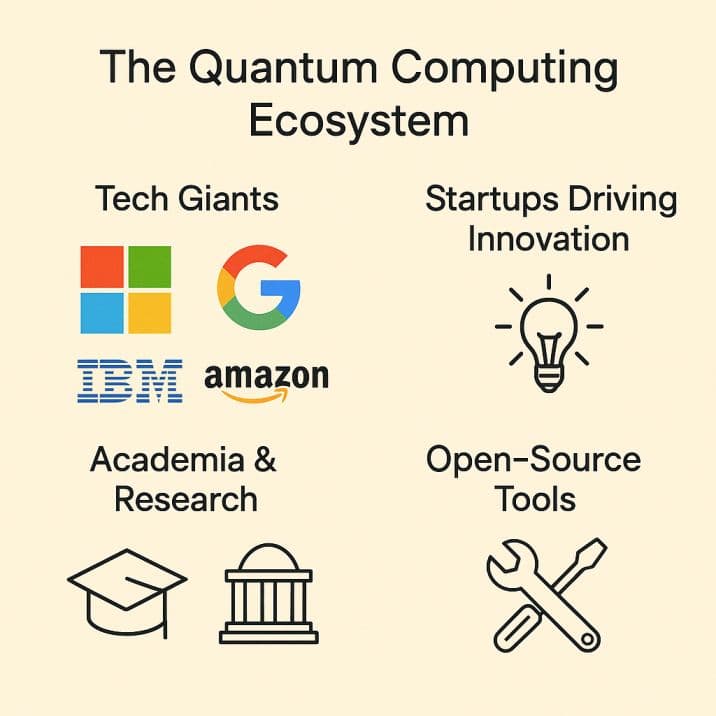Quantum Computing in 2025 – Tech Giants, Startups & Real-World Applications
1. Introduction to Quantum Computing
Quantum computing isn’t just another buzzword—it’s a completely new way of thinking about computers. Unlike our everyday laptops or phones that run on classical computing, quantum computers use the strange but powerful rules of quantum mechanics.
-
What is Quantum Computing?
It’s a technology that uses the laws of physics at the atomic level to process information. Instead of simple 0s and 1s, quantum computers use qubits, which can exist in multiple states at once.
-
How it differs from Classical Computing
While classical computers process tasks one step at a time, quantum computers can explore many possibilities at once, thanks to superposition and entanglement.
-
Why it matters today
From solving complex medical problems to securing our digital world, quantum computing promises breakthroughs that were once impossible with normal machines.
2. Fundamentals of Quantum Mechanics in Computing
To understand why quantum computers are so special, let’s break down the basics:
-
Qubits vs. Classical Bits : -
Classical bits can only be 0 or 1. Qubits can be 0, 1, or both at the same time, giving them superpowers in processing information.
-
Superposition : -
Imagine reading two books at the same time instead of one after the other—that’s what superposition allows quantum computers to do.
-
Entanglement : -
This is like a magical connection between qubits. Change one, and the other reacts instantly, no matter how far apart they are. This property helps in faster and more secure communication.
-
Quantum Gates & Circuits : -
Just as classical computers use logic gates (AND, OR, NOT), quantum computers use quantum gates to control qubits and perform calculations—but in a way that feels more like bending reality.

3. The Quantum Advantages
So, why all the hype?
-
Speed & Power : -
Quantum computers can solve problems in seconds that would take classical computers thousands of years.
-
Tough Problems Made Easy : -
Things like simulating molecules, cracking encryption, or optimizing global supply chains are nightmares for today’s computers—but quantum machines handle them naturally.
-
Game-Changing Examples : -
→ Designing life-saving drugs in record time
→ Predicting financial markets with greater accuracy
→ Finding the most efficient delivery routes instantly
→ Creating breakthroughs in climate and energy research
4. The Quantum Disadvantages
Quantum computing is powerful, but it’s not without serious challenges.
-
Extremely Expensive : -
Quantum machines require ultra-cold environments, advanced lasers, and vacuum systems—making them costly to build and maintain, accessible only to a few large organizations.
-
Error-Prone & Unstable : -
Qubits are extremely delicate and can easily lose information due to noise, heat, or tiny disturbances. Error correction methods exist but are still not reliable at scale.
-
Scalability Roadblock : - Current systems operate with only a few hundred qubits. To solve real-world problems, we’ll need millions of stable qubits, which is still far from achievable.
-
Talent Shortage : -
Building and programming quantum computers requires expertise across physics, computer science, and engineering. The lack of skilled professionals slows innovation and adoption.
-
Security Risks : -
Once powerful enough, quantum computers could break today’s widely used encryption methods (RSA, ECC), putting data privacy at risk unless post-quantum cryptography is adopted.
-
Uncertain Future : - Despite huge investments and progress, practical large-scale quantum computers may still be decades away, raising concerns about whether current hype matches reality.
5. The Quantum Computing Ecosystem
Quantum computing isn’t built by one company—it’s a growing ecosystem.
-
Tech Giants : -
IBM, Google, Microsoft, and Amazon are racing to build the most powerful quantum systems.
-
Startups Driving Innovation : -
Companies like Rigetti, IonQ, and Xanadu are experimenting with new approaches and hardware.
-
Academia & Research : -
Universities and labs across the globe are pushing boundaries with groundbreaking experiments.
-
Government Support : -
Countries are funding national quantum programs because they see it as a future-defining technology.
-
Open-Source Tools : -
Frameworks like Qiskit, Cirq, and PennyLane are making quantum programming accessible for developers and researchers worldwide.

6. Real-World Applications of Quantum Computing
Quantum computing isn’t just theory anymore—it’s finding practical uses:
-
Cybersecurity : -
While it may break today’s encryption, it also opens the door for quantum-safe security that hackers can’t crack.
-
Drug Discovery & Healthcare : -
Quantum simulations can help design medicines and understand diseases faster than ever.
-
Finance : -
Banks and investors can run complex models for risk analysis and portfolio optimization in record time.
-
Artificial Intelligence : -
Quantum AI can train models faster and make machine learning smarter.
-
Logistics & Supply Chains : -
Imagine instantly finding the best routes for thousands of deliveries—quantum computing makes it possible.
-
Climate & Energy :-
From predicting weather to improving renewable energy systems, quantum helps us tackle global challenges.

7. The Future of the Quantum Ecosystem
So, what lies ahead for quantum technology?
-
Hybrid Quantum-Classical Computing : -
In the near future, we won’t replace classical computers completely. Instead, we’ll use hybrid systems, where quantum computers handle complex problems while classical ones manage everyday tasks.
-
Quantum Cloud Services : -
Just like we use cloud services today, companies like IBM and Amazon are already offering quantum access via the cloud, so businesses can experiment without buying the hardware.
-
Quantum Internet & Secure Communication : -
Imagine an internet where hacking is nearly impossible. Quantum communication could make that real by using entanglement for ultra-secure data transfer.
-
Predictions (5, 10, 20 years ahead) : -
- 5 years: Wider access to cloud-based quantum machines for researchers and companies.
- 10 years: Quantum computing may start solving real industry problems at scale.
- 20 years: Fully integrated quantum systems could become mainstream, transforming entire industries.
8. Strategic Implications
Quantum isn’t just for scientists—it will impact businesses, careers, and even ethics.
-
Preparing for the Quantum Future : -
Businesses should start exploring where quantum could help them, whether in finance, logistics, or cybersecurity, and build small pilot projects today.
-
Investment & Career Opportunities : -
Startups, research labs, and tech giants are all hiring talent. Careers in quantum programming, physics, AI, and data science will skyrocket in demand.
-
Ethical & Security Concerns : -
With great power comes great responsibility. Quantum could break today’s encryption, raising privacy risks. Governments, researchers, and companies must ensure it’s used safely and fairly.

9. Conclusion
Quantum computing is more than a technology—it’s the foundation of a new digital era. With collaboration between tech, academia, and governments, we are stepping into a future where problems once thought impossible could finally be solved.
Quantum computing is no longer science fiction—it’s science in action.
-
Recap of Potential : -
From curing diseases to securing the internet, from financial breakthroughs to fighting climate change, quantum has the power to reshape our world.
-
Collaboration is Key : -
No single company or country can unlock quantum’s full potential alone. Progress will require teamwork between tech giants, startups, researchers, and governments.
-
The Roadmap Ahead : -
We are at the starting line of a new technological revolution. The choices we make today—investing in research, education, and ethics—will decide how quickly we reach a quantum-powered future.




